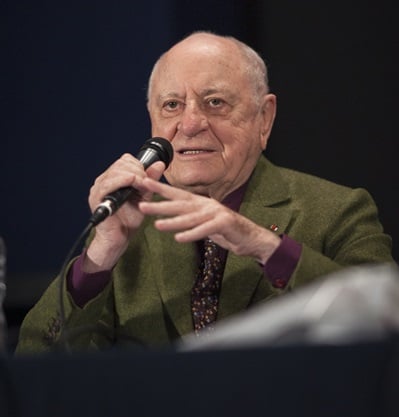Art World
‘Le Monde’ Owner Pierre Bergé Slams ‘Le Monde’ over HSBC Report


Eileen Kinsella

When is Le Monde co-owner Pierre Bergé not a fan of free speech and a free press? When his cronies are named as holders of Swiss bank accounts, that’s when. His outrage is all the more notable in view of the fact that none of them has been accused of wrongdoing.
According to the Guardian, Bergé, who co-founded Yves St. Laurent and was the legendary fashion designer’s longtime partner, “hit out at the newspaper over its part in revealing how HSBC’s Swiss banking arm helped wealthy customers dodge taxes, declaring: ‘It wasn’t for this that I allowed them to gain their independence’.” Editorial independence was guaranteed as part of the terms of the paper’s purchase in 2010.
Bergé, president of Le Monde’s supervisory board as well as of Drouot auctioneer Pierre Bergé & Associés, criticized his paper on RTL radio, accusing journalists of “informing” on people. “Is it the role of a newspaper to throw the names of people out there? … I don’t want to compare it to times past but all the same, informing is informing.” He further accused the paper of “populism” and “flattering the worst instincts.”
Another co-owner, Matthieu Pigasse, head of Paris’s Lazard investment bank, also weighed in: “It’s true that there is a balance to be struck between disclosing information that is in the public interest and falling into a form of fiscal McCarthyism and informing,” he said. Pigasse did stress that he was “proud” of Le Monde’s work. (The third co-owner is telecom magnate Xavier Niel. The three swooped in to save the paper from bankruptcy.)
Le Monde‘s journalist union responded to Bergé’s attack: “We forcefully condemn, as on previous such occasions, this intrusion into editorial content. The role of shareholders is to define company strategy and not to try to lean on news sense.”
Guardian writer Roy Greenslade asserts that Bergé’s criticism “lays bare fragility of press freedom.” Regarding the paper’s independence, he writes, “So what was it for, Monsieur Bergé? What does independence mean if you cannot use it? In what way is your intervention a statement of independence?”
“The reason that people own newspapers, especially loss-making newspapers, is all about having influence over editorial content,” Greenslade writes. “And one key part of that influence is to ensure that their mates, the wealthy élite, are protected from scrutiny.”